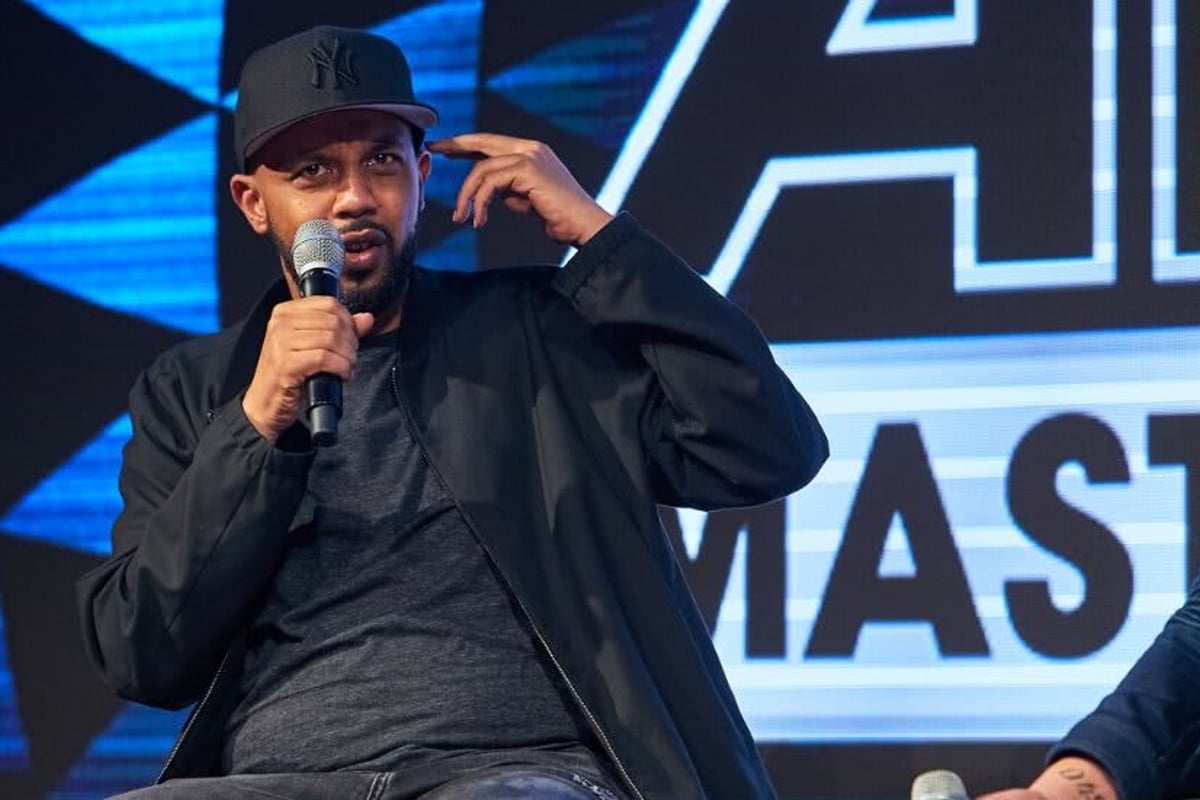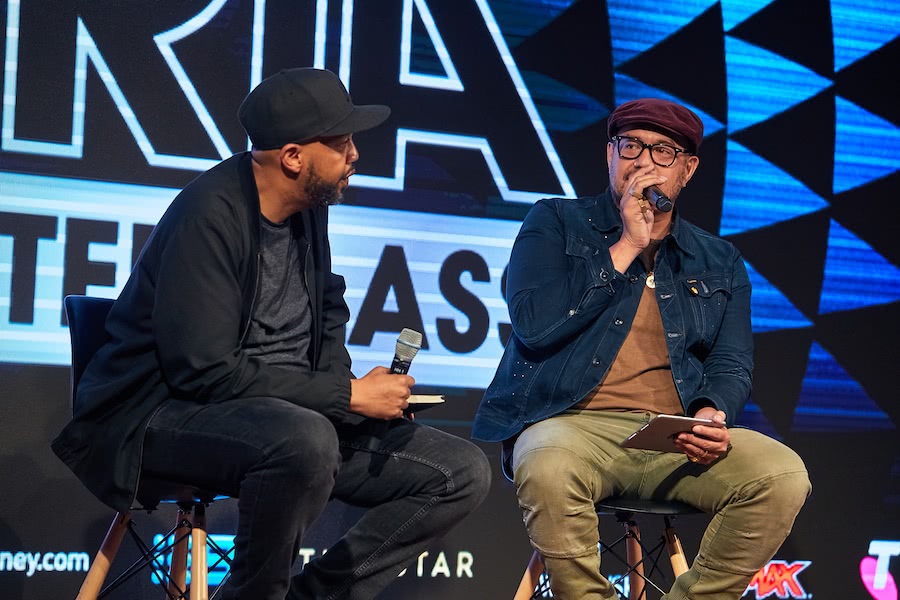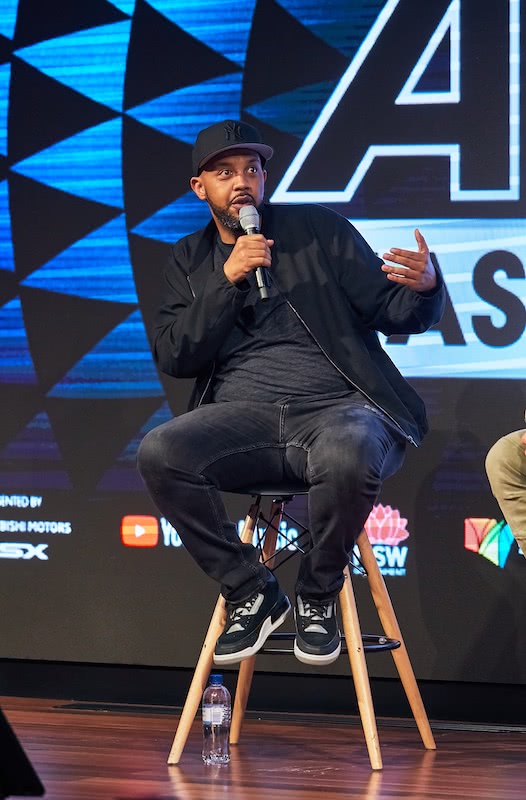6 essential lessons from YouTube’s Director of Urban Music, Tuma Basa

ARIA’s annual Masterclass series today did not disappoint, and it showed off the industry body’s continued focus on hip hop.
Following last year’s Masterclass featuring Apple Music’s Zane Lowe, Briggs, Kwame and Sampa The Great, this year featured one of the biggest names in hip hop programming, Tuma Basa.
Born in Rwanda, Tuma Basa has spent his entire career in the hip hop world from interning for entertainment attorney Theo Sedlmayr (who now represents Drake, Rick Ross, and 50 Cent), to working with P.Diddy for three years in the ‘90s, curating Rap Caviar at Spotify as the global programming head of hip-hop, to his role now as Director of Urban Music for YouTube Music. To call Basa an authority on hip hop is an understatement.
In an interview at Telstra’s CIC in Sydney with local hip hop musician and radio host Hau Latukefu, Basa spoke candidly about the realities of playlisting, ‘third culture kids’, why Atlanta is an example of success breeding success, and much more.

Tuma Basa and Hau Latukefu
Check out our six essential take-aways from the chat, in Tuma Basa’s own words below:
1. Cultural duality is no longer a social stigma
I’m seeing that with the explosion of afro-beats in the United States and the United Kingdom. The evangelist audience who are making it popular there are the kids of Nigerian immigrants who are at the same club, they talk to same girls, popping bottles… they’re making it hot in the clubs in the UK and the United States.
Because of social media they can keep in touch to what’s happening with their cousins. When I was growing up it was expensive to travel so you only went on big, big trips and you remembered every moment of it.
[…] People who have embraced duality and say, ‘Hey you know what? I’m both American and I’m this…’. ‘I’m both Australian and I’m this’. We call them third culture kids.
[…] The hybrid is that mix of your own culture – and that’s where your work ethic comes from, maybe that’s where your concept of spousal relationship comes from, maybe that’s where your concept of discipline comes from – now that is a gift. It’s a talent, it’s an advantage, it’s not a social stigma anymore.
Australia is very interesting, it’s an immigrant state. It’s a nation that’s populated with first, second, third generation immigrants who have a competitive advantage when it comes to music business.
We have Polynesians in the States, so when OneFour does a hot record here, somebody in Carson, California is going to be like, ‘Oh these guys are hard, that’s like my cousin Eddy’. You’re getting that evangelist for an export, in real time.
[…] The people who used to be disadvantaged are now advantaged and it’s up to the music industry to embrace that.

Tuma Basa, YouTube’s Director of Urban Music
2. Success begets success
When L.A Reid and Babyface came to Atlanta, they changed everything. They came to Atlanta in 1989-1990, they changed everything in that town, it didn’t have any infrastructure, it didn’t have real record labels. And a lot of people got inspired.
So when they had success with Outkast, and TLC and with Usher, all of a sudden […] you had so much going on in a town that’s not even Top 10 in terms of size. When you do geographic fusion studies on how songs become hits, you can trace it back to Atlanta, even if the song or the artist is not from Atlanta.
[…] When people see success – and in Australia there’s been a lot of success in the pop and lock world – it becomes doable. It becomes realisable. This isn’t even music business stuff, this is life. There’s a blueprint.
3. Music programming is like a car park
[Playlists are] like parking spots, there’s no parking space unless another car leaves, unless the song burns out. There’s nothing I can do about it. Part of that vetting of a song is, ‘is this going to be information pollution to our audience?’.
They have too much going on and they’re relying on me, or the platform that I curate or programme, to be honest with them and say, ‘these are the ones that you need to know so you can go on and do your homework, or you can go to soccer practise or you can go to church’.
Guess what? People have real lives. Not everybody is like the people in this room who get paid to listen to music. [Music fans] look to trusted filters like triple j, like the YouTube playlist, and other examples.
4. You can stay in the zeitgeist even if you’re out of it
I worked for Puff Daddy, Sean Combs, for three years. If you work for him, he’s kind of like a Sergeant in the army, he’ll be on you.
What he used to tell us was, ‘You’re not out in the clubs, I’m in the clubs more than you. Who’s your cultural touchpoint?’ And what he was talking about was mentoring young people who keep you up on the hottest shit out there. They had the discretionary time, they had the discretionary income. That’s their whole life. They don’t have responsibilities yet.
[P.Diddy] would be like, ‘Who you talking to? Who told you about that?’ And he was doing it just to mess with your head. But that’s how he kept sharp. That’s how he stayed in the culture and the zeitgeist.
[…] It’s an organic reciprocation. That cultural touchpoint of making sure there are people out there who are deep in the life because say, you’re busy, or you’re in Australia…
5. Mentees need to prove they’re not a liability
I get a lot of DM requests from Rwanda who are like, ‘can you be my mentor?’. No. That’s not how it works. Share what you’re working on, let it come organically.
[…] The mentor thing I think is being around, but also showing that you’re not going to be a liability. When I interned I got good advice because I did three unpaid internships.
I was like, ‘Why don’t they just hire a million interns, it’s free’. And they were like, ‘Because they don’t want to supervise you. They want someone who is going to take some of the work off of them rather than be additional work.’
[The crux of a] mentor relationship is that you do your thing and at critical times you keep that communication open with that elder, that mentor, that senior – and you’re not coming to them with problems. If that person is your mentor, that person already has a lot on his or her plate already.
6. Work art, work smart and work hard
The ‘work art’ part is working artfully, and enjoying what you do, passion. […] We’re in music, the reason we do this is because we’re passionate.
The ‘work smart’ part is being strategic and working with other people. It’s knowing that your core competency might be ‘this’, this person’s core competency might be ‘that’, and you can complement each other. You can work together.
That’s what team work means; and it’s not always your designated team, we as a room might informally become a team.
The ‘work hard’ part – and I put that third on purpose because a lot of people it first and they burn themselves out – is once the art part and smart part are figured out, then that’s the execution.
That’s why I’m lucky to be working at YouTube because they’ve been giving me my time to build and work on certain things so that I get it right. They’re more concerned about getting it right than getting it out there.
This article originally appeared on The Industry Observer, which is now part of The Music Network.






























